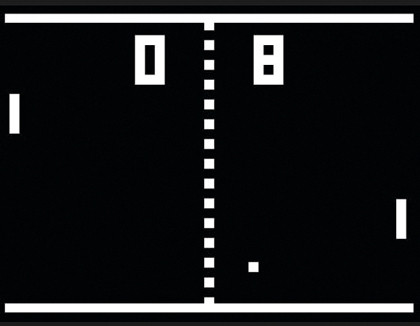Four legends who changed gaming
John Carmack, Alexey Pajitnov, Sid Meier and Nolan Bushnell interviewed
Sign up for breaking news, reviews, opinion, top tech deals, and more.
You are now subscribed
Your newsletter sign-up was successful

Atari's success as an entertainment platform, along with Al Alcorn and Ted Dabney, and Pong shot Nolan Bushnell into the history books. He's been inducted into the Video Game Hall of Fame, the Consumer Electronics Association Hall of Fame, awarded a BAFTA Games Award Fellowship and was named one of Newsweek's 50 Men That Changed America.
Tamsin Oxford: How does it feel to be considered a gaming legend?
Nolan Bushnell: I'm the kind of guy who always focuses on what he's working on currently so, yeah, I'm proud of the fact that I'm thought of in that way but, at the same time, it felt like a natural thing for me to do at the time.
TO: It was playing Spacewar! on the DEC PDP-1 that made you realise that there was a potential business in gaming, but was there also a passion for the games themselves?
NB: Absolutely! In fact, I played Spacewar! incessantly and almost failed one quarter (at university) because of it (laughs, a lot).
TO: Were any of your initial days in gaming development ever defined by a 'Eureka!' moment, when you suddenly sat up and said, "That's it!"?
NB: There was a magic point when I got the first rocket ship to display on the screen while I was developing Computer Space. It was such an epiphany for me. I knew I could do it but there's a difference between knowing you can do something and actually doing it. I can close my eyes and see that old TV tilted on its side and the little rocket ship defined out of diodes. That was really the turning point for Computer Space.
Sign up for breaking news, reviews, opinion, top tech deals, and more.
TO: Can you name one of the worst and one of the best things about being among the first people in the world to create games?
NB: Well, we could churn out a pretty complex game in a couple of months, and that's going right to the circuit board and getting it ready for production. I can remember when we created Pong. Al Alcorn did Pong on the hardware level. I was teaching him and this was a training project for him.
I can remember the time we put in the algorithm that caused the ball to angle based on where you hit it on the paddle. Before that it wasn't a game, after that it was a very good game.
I like to say that Pong had a square ball not because we thought a ball should be square, but because that was all we were able to do at the time with the technology. In those days, in some ways, the games were simpler and the process was simpler. Pong, from concept to playability, took less than a week, so in terms of return on time spent it was pretty exciting.
Today, of course, the large amounts of graphics have changed that. When we used to do graphics we would invent the characters on graph paper and mark them out on an 8 x 8 grid of dots. To get the dot into exactly the right place you'd mark the dot and then go across the room and say 'Does that look right?' and then you'd move the dot up or down or erase it and go 'Yeah, that looks a little better!' (laughs). You know, I remember stuff that nobody does anymore!
TO: Can you tell me one tale about your days of Atari that nobody else knows about?
NB: This is kind of amusing. A guy stole a design out of our labs and started a company. They were going to compete with Atari using a game called Viper Plane. Of course, we got a restraining order so they couldn't show this game at the upcoming trade show, but then we heard that they were at the show anyway and pulling our distributors up into a hotel room. In the same hotel we were staying at!
So one night we were maybe drinking a little too much and decided that we were going to take the law into our own hands and break into the guys room and beat the sh*t out of him. And so with all pompous self righteousness about how they were thwarting the law with this product, we pounded on his door, really put our elbows into it, but nobody was answering the door. And we couldn't really break it down.
So with sore shoulders we went back down to the bar muttering about the injustices of life. I've often looked back and said, 'Thank God we didn't carry that out.' It was one of those things that seemed like a good idea at the time but really wasn't.

TO: In terms of PC gaming, who would you define as your fellow legends and why?
NB: Oh, I definitely think my head of engineering, Al Alcorn. I've always joked with him and said that I've got a lot of credit for the stuff that he did. Al was a guy who could create a lot of very, very interesting technology that allowed me to put games out as a result. Of course, Carmack and Romero from id games. The early Doom was, I think, a technological tour de force. That they were able to do what they did, they just have to be legends.
Alexey Pajitnov created a great series of casual games. The Civilization series from Sid Meier is something I've always had admiration for. It's a thing where some people's work just stands out, is revolutionary and just good stuff. I can't forget Steve Russell from MIT who programmed Spacewar!, I've always said he's the guy on whose shoulders I stood.
TO: What games are you playing now? Are you enjoying them?
NB: I play Warcraft with my son, not WoW, the old Warcraft and I also play a lot of casual games. My kids always beat me at first person shooters so I try and play games I can win.
-------------------------------------------------------------------------------------------------------
First published in PCFormat Issue 235
Liked this? Then check out Past, present and future of the demoscene
Sign up for TechRadar's free Weird Week in Tech newsletter
Get the oddest tech stories of the week, plus the most popular news and reviews delivered straight to your inbox. Sign up at http://www.techradar.com/register